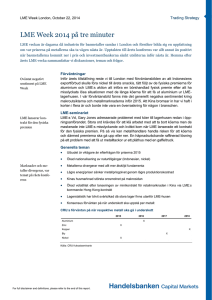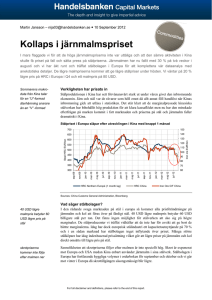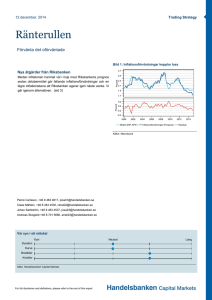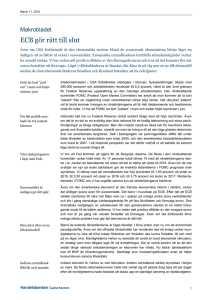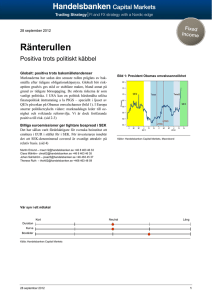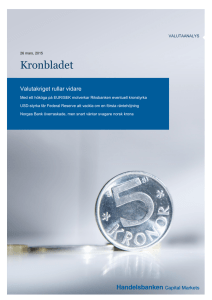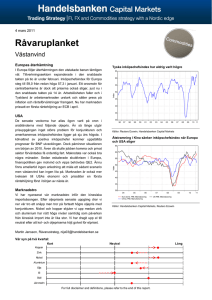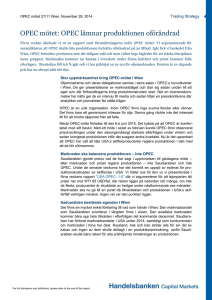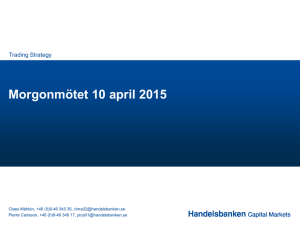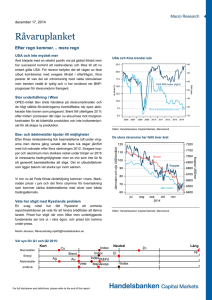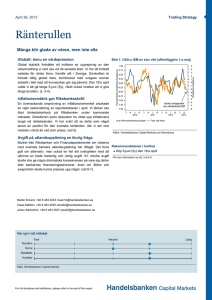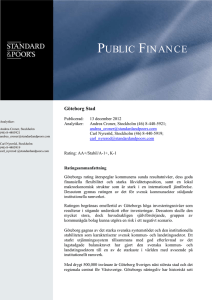Federal Reserve har ammunition kvar
advertisement
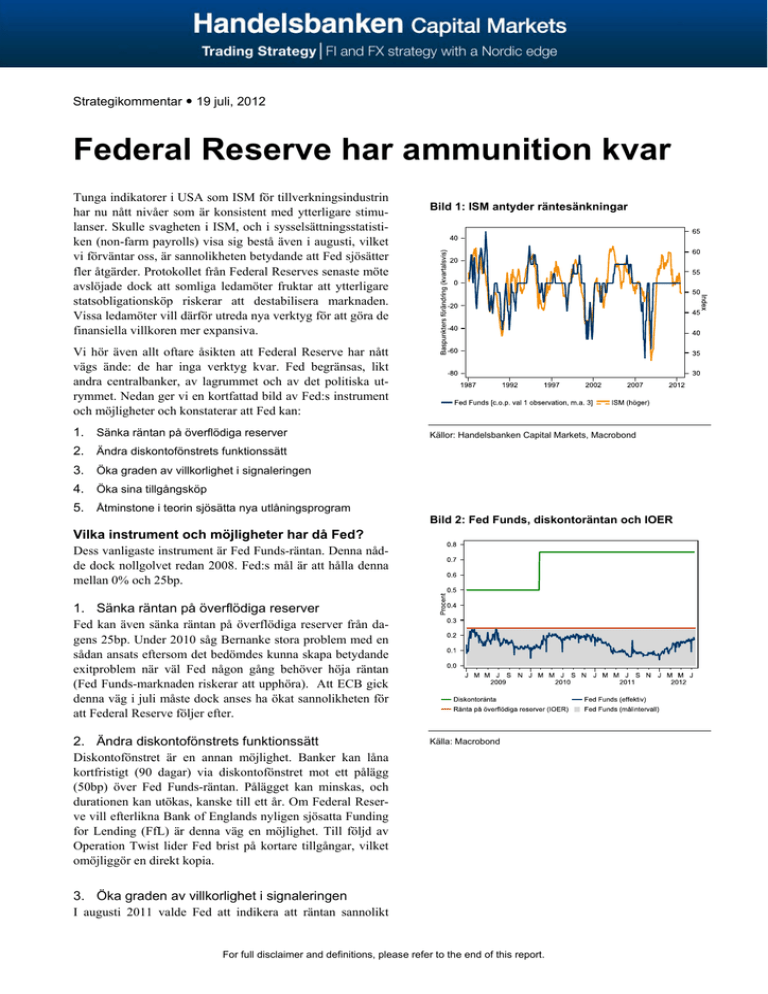
Strategikommentar 19 juli, 2012 Federal Reserve har ammunition kvar Tunga indikatorer i USA som ISM för tillverkningsindustrin har nu nått nivåer som är konsistent med ytterligare stimulanser. Skulle svagheten i ISM, och i sysselsättningsstatistiken (non-farm payrolls) visa sig bestå även i augusti, vilket vi förväntar oss, är sannolikheten betydande att Fed sjösätter fler åtgärder. Protokollet från Federal Reserves senaste möte avslöjade dock att somliga ledamöter fruktar att ytterligare statsobligationsköp riskerar att destabilisera marknaden. Vissa ledamöter vill därför utreda nya verktyg för att göra de finansiella villkoren mer expansiva. Bild 1: ISM antyder räntesänkningar Vi hör även allt oftare åsikten att Federal Reserve har nått vägs ände: de har inga verktyg kvar. Fed begränsas, likt andra centralbanker, av lagrummet och av det politiska utrymmet. Nedan ger vi en kortfattad bild av Fed:s instrument och möjligheter och konstaterar att Fed kan: 1. Sänka räntan på överflödiga reserver Källor: Handelsbanken Capital Markets, Macrobond 2. Ändra diskontofönstrets funktionssätt 3. Öka graden av villkorlighet i signaleringen 4. Öka sina tillgångsköp 5. Åtminstone i teorin sjösätta nya utlåningsprogram Bild 2: Fed Funds, diskontoräntan och IOER Vilka instrument och möjligheter har då Fed? Dess vanligaste instrument är Fed Funds-räntan. Denna nådde dock nollgolvet redan 2008. Fed:s mål är att hålla denna mellan 0% och 25bp. 1. Sänka räntan på överflödiga reserver Fed kan även sänka räntan på överflödiga reserver från dagens 25bp. Under 2010 såg Bernanke stora problem med en sådan ansats eftersom det bedömdes kunna skapa betydande exitproblem när väl Fed någon gång behöver höja räntan (Fed Funds-marknaden riskerar att upphöra). Att ECB gick denna väg i juli måste dock anses ha ökat sannolikheten för att Federal Reserve följer efter. 2. Ändra diskontofönstrets funktionssätt Diskontofönstret är en annan möjlighet. Banker kan låna kortfristigt (90 dagar) via diskontofönstret mot ett pålägg (50bp) över Fed Funds-räntan. Pålägget kan minskas, och durationen kan utökas, kanske till ett år. Om Federal Reserve vill efterlikna Bank of Englands nyligen sjösatta Funding for Lending (FfL) är denna väg en möjlighet. Till följd av Operation Twist lider Fed brist på kortare tillgångar, vilket omöjliggör en direkt kopia. Källa: Macrobond 3. Öka graden av villkorlighet i signaleringen I augusti 2011 valde Fed att indikera att räntan sannolikt For full disclaimer and definitions, please refer to the end of this report. kommer att behöva hållas på extremt låga nivåer åtminstone till mitten av 2013. En tidpunkt som sedan ändrades till slutet av 2014. Ju längre bort i tiden desto mindre trovärdig blir dock en sådan signal. Bild 3: Federal Reserve:s obligationsinnehav Federal Reserve skulle också kunna öka graden av villkorlighet: att lova att hålla räntan nära noll till dess att vissa villkor är uppfyllda. Evans vid Chicago Fed har exempelvis föreslagit en 7/3-regel1 där penningpolitiken inte blir åtstramande förrän arbetslösheten är under 7% eller om medelfristig inflation stiger över 3%. Hittills har dess ”QE-program” omfattat köp av både statsobligationer och agencies (Fannie Mae och Freddie Mac:s bostadsobligationer). Härvidlag råder det nu viss osäkerhet kring om det är fruktbart att utöka köpen eller ej. Exempelvis äger Fed redan 17% av alla utestående statspapper (obligationer, växlar, mm). Fed äger även 10% av utestående bostadsobligationer. Att pressa ned räntor blir förvisso svårare ju lägre de är: lägre räntor gör risk/reward allt mer skruvat åt värdeförluster för privata investerare. Mer utrymme bör dock finnas, speciellt vad gäller bostadsobligationer. Att köpa kommunskulder eller utländska tillgångar (t.ex. spanska statsobligationer) skulle snabbt bli politiskt infekterat. Att centralbanken väljer vilka kommunpapper den köper och i hur stor omfattning leder lätt till politiska frågetecken. Att köpa utländska tillgångar skulle ses som ett slag i ett ”valutakrig”. Dessutom är det US Treasury, ej Fed, som är det högsta hönset vad gäller landets valutapolitik. Bild 4: Nominella innehav, och som andel av stock 12,000 18 Share of outstanding (right) 16 10,000 14 8,000 12 10 6,000 8 4,000 6 4 2,000 2 0 0 Källa: Handelsbanken Capital Markets Under tillgångsköp faller också verktyg som ”Operation Twist”, där kompositionen av centralbankens balansräkning förändras. Ju längre duration/riskablare balansräkning, desto större påverkan på andra (riskabla) marknadspriser. Fed kan inte köpa aktier eller företagsobligationer, Fed kan inte heller dela ut pengar till allmänheten. 5. Sjösätta nya utlåningsprogram Centralbanken kan också låna ut, till depåinstitutioner (depository institutions) – mot tillfredställande säkerheter och 1 2 Evans, C (2011). The Fed's dual mandate responsibilities and challenges facing U.S. monetary policy Campbell et al (2011). Macroeconomic Effects of FOMC Forward Guidance 19 juli, 2012 2 Fed holdings as percent of outstanding 4. Ökade tillgångsköp Fed har även mandat att köpa statsobligationer, agencies (inklusive vissa bostadsobligationer), kortfristig kommunskuld, utländsk valuta och utländska statsobligationer. Källa: Bloomberg. Notis: Köpta MBS var garanterade av Fannie Mae, Freddie Mac och Ginnie Mae. Fed köpte också obligationer emitterade av Fannie och Freddie (Federal agency debt securities) billions Intressant läsning i sammanhanget utgörs av Campbell et al (2012) som analyserar centralbankens vägledning2 genom en tudelning i delfisk (förutsägelser likt oraklet i Delfis) och odysseisk (där centralbanken likt Odysseus surrar sig vid masten (håller räntan låg) för att trots sirenernas kall (växande ekonomi) ej lockas ned i havet (sjösätta åtstramning)). vid nödsituationer även till andra aktörer (mot säkerheter även i detta fall). Depåinstitutioner har dock små behov av ytterligare likviditet och har redan låg finansieringskostnad vilket gör effekterna begränsade från ett sådant program (se även diskussionen om diskontofönstret ovan). Den senare formen av utlåning är mer intressant. Den användes år 2009 genom TALF (Term Asset-Backed Securities Loan Facility). TALF lanserades i syfte att sporra efterfrågan på värdepapperiserade krediter (ABS) genom att underlätta finansieringen vid sådana investeringar (då bidrog Treasury med säkerheten genom att garantera de första eventuella förlusterna). Sedermera har dock lagstiftningen inskränkt Fed:s möjligheter. Treasury har nu en uttrycklig översynsroll och skattebetalarna erhåller nu ett tydligare och hårdare skydd. Det är dock osannolikt att en TALF-liknande konstruktion skulle kunna implementeras idag för att sporra efterfrågan på riskablare tillgångar - åtminstone inte i ljuset av kongressens svårigheter att enas kring den förda ekonomiska politiken. Större åtgärder osannolika redan i augusti Fedchefen Bernanke menar att förlängningen av Operation Twist den 20:e juni i sig utgör en ”materiell lättnad” av de penningpolitiska förhållandena. Detta gör större åtgärder mindre sannolika på kort sikt. Att flera marknader dessutom räknar med att ytterligare stimulanser snart sjösätts ger dessutom Fed mer tid – tid att vänta och se. Sedan dess junimöte har viktig statistik som sysselsättningen och ISM överraskat negativt. Kanske tar Fed också ännu ett litet steg redan den första augusti. I så fall är ett signaleringsknep det mest sannolika. Om Fed vill ge samma signal som de gjorde vid början av året bör de antyda att låga räntorna kommer att bestå till (åtminstone) mitten av 2015. Vi ser dessutom med spänning fram emot Bernankes tal vid Jackson Hole-konferensen den sista augusti. Förmodligen kommer centralbankens tankar kring ytterligare stimulansmöjligheter då presenteras. Förväntningarna (på QE3) är överlag höga inför Federal Reserves möte den 13:e september. Dessa förväntningar infrias sannolikt bara om statistiken fortsätter att överraska tydligt negativt. Martin Enlund – maen12@handelsbanken.se +46 8 463 46 33 19 juli, 2012 3 Research Disclaimers Handelsbanken Capital Markets, a division of Svenska Handelsbanken AB (publ) (collectively referred to herein as ‘SHB’) is responsible for the preparation of research reports. All research reports are prepared from trade and statistical services and other information which SHB considers to be reliable. SHB has not independently verified such information and does not represent that such information is true, accurate or complete. Accordingly, to the extent permitted by law, neither SHB, nor any of its directors, officers or employees, nor any other person, accepts any liability whatsoever for any loss howsoever arising from any use of such research reports or its contents or otherwise arising in connection therewith. This report has not been given to the subject company, or any other external party, prior to publication to approval the accuracy of the facts presented. The subject company has not been notified of the recommendation, target price or estimate changes, as stated in this report, prior to publication. In no event will SHB or any of its affiliates, their officers, directors or employees be liable to any person for any direct, indirect, special or consequential damages arising out of any use of the information contained in the research reports, including without limitation any lost profits even if SHB is expressly advised of the possibility or likelihood of such damages. Any opinions expressed are the opinions of employees of SHB and its affiliates and reflect their judgment at this date and are subject to change, and there can be no assurance that future events will be consistent with any such opinions. The information in the research reports does not constitute a personal recommendation or personalized investment advice. Reliance should not be placed on such reports or opinions expressed therein when making investment or strategic decisions. SHB, its affiliates, their clients, officers, directors or employees own or have positions in securities mentioned in research reports. SHB and/or its affiliates provide investment banking and noninvestment banking financial services, including corporate banking services; and, securities advice to issuers of securities mentioned in research reports. This document does not constitute or form part of any offer for sale or subscription of or solicitation of any offer to buy or subscribe for any securities nor shall it or any part of it form the basis of or be relied on in connection with any contract or commitment whatsoever. Past performance may not be repeated and should not be seen as an indication of future performance. The value of investments and the income from them may go down as well as up and investors may forfeit all principal originally invested. Investors are not guaranteed to make profits on investments and may lose money. Exchange rates may cause the value of overseas investments and the income arising from them to rise or fall. This research product will be updated on a regular basis. The distribution of this document in certain jurisdictions may be restricted by law and persons into whose possession this document comes should inform themselves about, and observe, any such restrictions. Distribution of our research in any such other jurisdictions may constitute a violation of UK or US securities laws, or the law of any such other jurisdiction. No part of SHB research reports may be reproduced or distributed to any other person without the prior written consent of SHB. Research reports are distributed in the UK by SHB. SHB is authorised by the Swedish Financial Supervisory Authority (Finansinspektionen), and authorised and subject to limited regulation by the UK Financial Services Authority. Details about the extent of our authorisation and regulation by the UK Financial Services Authority are available from us on request. From time to time, we may offer investment banking and other services to any of the companies mentioned in our research. We may act as adviser and/or broker to any of the companies mentioned in our research. We buy and sell the securities mentioned in our research from customers on a principal basis. Accordingly, we may at any time have a long or short position in any such securities. We may make a market in the securities of all the companies mentioned in this report. [Further information and relevant disclosures are contained within our research reports.] This document may be distributed in the United Kingdom only to persons who are authorised or exempted persons within the meaning of the Financial Services and Markets Act 2000 (as amended) (or any order made thereunder) or (i) to persons who have professional experience in matters relating to investments falling within Article 19(5) of the Financial Services and Markets Act 2000 (Financial Promotion) Order 2005 (the “Order”), (ii) to high net worth entities falling within Article 49(2)(a) to (d) of the Order or (iii) to persons who are professional clients under Chapter 3 of the FSA Conduct of Business Sourcebook (all such persons together being referred to as “Relevant Persons”). The research reports are directed only at Relevant Persons, other persons should not act or rely on such reports or any of their contents. UK customers should note that SHB does not participate in the UK Financial Services Compensation Scheme for investment business and accordingly UK customers will not be protected by that scheme. SHB employees, including analysts, receive compensation that is generated by overall firm profitability. The views contained in SHB research reports accurately reflect the personal views of the respective analysts, and no part of analysts’ compensation is directly or indirectly related to specific recommendations or views expressed within research reports. For specific analyst certification, please contact Robert Gärtner on tel +45 46 79 1613. In the United Kingdom SHB is regulated by the Financial Services Authority but recipients should note that neither the UK Financial Services Compensation Scheme nor the rules of the FSA made under the UK Financial Services and Markets Act 2000 for the protection of private customers apply to this research report. When Distributed in the United States Important Third-Party Research Disclosures: Research reports are prepared by SHB for information purposes only. SHB and its employees are not subject to FINRA’s research analyst rules which are intended to prevent conflicts of interest by, among other things, prohibiting certain compensation practices, restricting trading by analysts and restricting communications with the companies that are the subject of the research report. SHB research reports are intended for distribution in the United States solely to “major U.S. institutional investors,” as defined in Rule 15a-6 under the Securities Exchange Act of 1934. Each major U.S. institutional investor that receives a copy of research report by its acceptance hereof represents and agrees that it shall not distribute or provide research reports to any other person. Reports regarding fixed-income products are prepared by SHB and distributed by SHB to major U.S. institutional investors under Rule 15a-6(a)(2). Each analyst identified in this research report certifies that the opinions expressed herein and attributed to such analyst accurately reflect his or her individual views about the companies or securities discussed in the research report, and that no part of such analyst’s compensation has been or will be related, directly or indirectly, to specific recommendations or views expressed in this research report. Reports regarding equity products are prepared by SHB and distributed in the United States by Handelsbanken Markets Securities Inc. (“HMSI”) under Rule 15a-6(a)(2). Any U.S. person receiving these research reports that desires to effect transactions in any equity product discussed within the research reports should call or write HMSI. HMSI is a FINRA Member, telephone number +1 212 326 5153. For company-specific disclosure texts, please consult the Handelsbanken Capital Markets website: www.handelsbanken.com/research. Those wishing to see the disclosure text who do not have the access to the website, please contact Robert Gärtner on tel +45 46 79 1613. Please be advised of the following important research disclosure statements: SHB is regulated in Sweden by the Swedish Financial Supervisory Authority, in Norway by the Financial Supervisory Authority of Norway, In Finland by the Financial Supervision of Finland and in Denmark by the Danish Financial Supervisory Authority. SHB has recently had, currently has, or will be seeking corporate finance assignments with the subject company. According to the Bank’s Ethical Guidelines for the Handelsbanken Group, the board and all employees of the Bank must observe high standards of ethics in carrying out their responsibilities at the Bank, as well as other assignments. The Bank has also adopted guidelines to ensure the integrity and independence of research analysts and the research department, as well as to identify, eliminate, avoid, deal with, or make public actual or potential conflicts of interests relating to analysts or the Bank. As part of its control of conflicts of interests, the Bank has introduced restrictions (“Chinese walls”) in communication between the Research department and other departments of the Bank. In addition, in the Bank’s organisational structure, the Research department is kept separate from the Corporate Finance department and other departments with similar remits. The guidelines also include regulations for how payments, bonuses and salaries may be paid out to analysts, what marketing activities an analyst may participate in, how analysts are to handle their own securities transactions and those of closely related persons, etc. In addition, there are restrictions in communications between analysts and the subject company. For full information on the Bank’s ethical guidelines and guidelines on conflicts of interests relating to analysts, please see the Bank’s website www.handelsbanken.com/About the bank/Investor relations/Corporate social responsibility/Ethical guidelines or Guidelines for research. Handelsbanken has a ZERO tolerance of bribery and corruption. This is established in the Bank’s Group Policy on Bribery and Corruption. The prohibition against bribery also includes the soliciting, arranging or accepting bribes intended for the employee’s family, friends, associates or acquaintances. Contact information Capital Markets Michael Green Head +46 8 701 43 56 Fixed Income, Foreign Exchange & Commodities Per Elcar Global co-head of Equities +46 8 701 19 49 Carl Cederschiöld Björn Linden Global co-head of Equities +44 7909528735 Jan Häggström Head of Economic Research and +46 8 701 10 97 Chief Economist, SHB Magnus Fageräng Head of Structured Products +46 8 701 30 72 Peter Karlsson Head of Equity & Credit Research +46 8 701 21 51 Head of Fixed Income, Currencies +46 8 701 10 38 and Commodities Håkan Larsson Head of Currencies Magnus Strömer Head of Commodities +46 8 463 45 19 +46 8 463 45 63 Lars Henriksson Head of F/X Sales +46 8 463 45 18 Trading Strategy Debt Capital Markets Tony Lindlöf Head of Debt Capital Markets Claes Måhlén Head +46 8 463 45 35 +46 8 701 25 10 Martin Enlund Senior Strategist FI/FX +46 8 463 46 33 Kjell Arvidsson Head of Loans +46 8 701 20 04 Johan Sahlström Senior Credit Strategist +46 8 463 45 37 Per Jäderberg Head of Structured Finance +46 8 701 33 51 Therese Öhlin Senior Credit Strategist +46 8 463 48 59 Måns Niklasson Head of Acquisition Finance +46 8 701 52 84 Martin Jansson Senior Commodity Strategist +46 8 461 23 43 Ulf Stejmar Head of Corporate Bonds +46 8 701 24 16 Nils Kristian Knudsen Senior Strategist FX/FI +47 22 82 30 10 Head of Economic Research +46 8 701 10 97 Denmark Petter Lundvik USA, Special Analysis +46 8 701 33 97 Rasmus Gudum-Sessingø Danish economy +45 467 91619 Gunnar Tersman Eastern Europe, Emerging +46 8 701 20 53 Thomas Haugaard +45 467 91229 Economic Research Jan Häggström Jes Asmussen Sweden Markets Helena Trygg Japan, United Kingdom +46 8 701 12 84 Anders Brunstedt Swedish Economy +46 8 701 54 32 Eva Dorenius Web Editor +46 8 701 50 54 Head, Economic Research +45 467 91203 Latin America, Emerging Markets Finland Tiina Helenius Head, Economic Research +358 10 444 2404 Tuulia Asplund Finnish economy +358 10 444 2403 Norway Knut Anton Mork Head, Economic Research +47 22 39 71 81 Ida Wolden Bache Norwegian economy +47 22 39 73 40 Nils Kristian Knudsen Senior Strategist FX/FI +47 22 82 30 10 Kari Due-Andresen Norwegian economy +47 22 39 70 07 Regional Sales Copenhagen Kristian Nielsen Luleå +45 46 79 12 69 Ove Larsson Gothenburg Karl-Johan Svensson +46 31 743 31 09 Christiane Junio Gävle Andreas Edvardson Helsinki Mika Rämänen Linköping Fredrik Lundgren London Ray Spiers Toll-free numbers +46 90 154 719 Luxembourg +352 274 868 244 Malmö +46 26 172 144 Jonas Darte +46 40 24 54 04 Oslo +358 10 444 62 20 Petter Fjellheim +47 22 82 30 29 Stockholm +46 13 28 91 10 Malin Nilén +46 8 701 27 70 Umeå +44 207 578 86 12 From Sweden to N.Y. & Singapore 020-58 64 46 Kenneth Båtsman From Norway to N.Y. & Singapore 800 40 333 From Denmark to N.Y. & Singapore 8001 72 02 +46 90 154 581 From Finland to N.Y. & Singapore 0800 91 11 00 Within the US 1-800 396-2758 Svenska Handelsbanken AB (publ) Stockholm Copenhagen Helsinki Oslo London New York Blasieholmstorg 11 SE-106 70 Stockholm Tel. +46 8 701 10 00 Fax. +46 8 701 12 40 Havneholmen 29 DK-1561 Copenhagen V Tel. +45 46 79 12 00 Fax. +45 46 79 15 52 Aleksanterinkatu 11 FI-00100 Helsinki Tel. +358 10 444 11 Fax. +358 10 444 2578 Tjuvholmen Allé 11, Postboks 1249 Vika NO-0110 Oslo Tel. +47 22 94 0700 Fax. +47 2233 6915 3 Thomas More Square London GB-E1W 1WY Tel. +44 207 578 8668 Fax. +44 207 578 8090 Handelsbanken Markets Securities, Inc. 875 Third Avenue, 4th Floor New York, NY 10022-7218 Tel. +1 212 326 5153 Fax. +1 212 326 2730 FINRA, SIPC
